Horatio Chapple death: Polar bear 'dragged boy from tent'
- Published
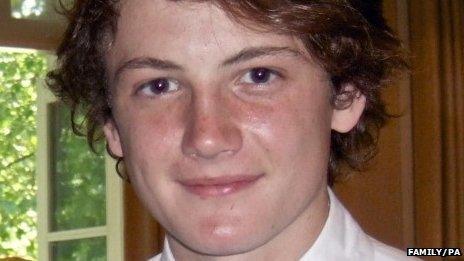
Horatio Chapple was mauled to death by a polar bear during an Arctic expedition
The leader of an Arctic expedition in which a polar bear ripped an Eton schoolboy from his tent and mauled him to death has admitted failings.
Horatio Chapple, 17, from Salisbury, died on an expedition to Svalbard, Norway, in August 2011, organised by the British Schools Exploring Society.
Richard Payne told an inquest into the death there were "deficiencies and failures" with their equipment.
Horatio's parents said they had harboured concerns about bear attacks.
'Not enough flares'
Speaking at their son's inquest, Olivia and David Chapple said they had examined a risk assessment document with their son before he left for the expedition in July 2011.
They said they believed a number of safety precautions would be in place to protect him.
Horatio Chapple death: Mother 'worried about polar bears'
Dr Olivia Chapple told the inquest she "believed and trusted the things that were listed".
"Otherwise I wouldn't have let him go. No parent or nobody would want to go on an expedition where a risk was categorised as likely yet the planning wasn't there."
Horatio's parents thought he would be equipped with a pen flare, a working trip wire around the camp and a weapon available to a trip leader in case of an attack.
But there were not enough pen flares, special devices which shoot flares up to 50 metres to frighten approaching bears - and these were only made available to team leaders, the inquest heard.
David Chapple told the hearing: "We were never told the bear trip wires only sometimes work. The risk assessment refers to flares being available to all members of the expedition.
"If this had been implemented then Horatio would have at least had some time to defend himself other than with his bare hands."
Richard Payne, chief leader of the expedition, told the inquest: "My intention was that all young explorers and leaders would have a pen flare.
'Out of character'
"It was only when we landed at base camp... that I discovered there wasn't enough pen flares to equip everybody on the expedition."
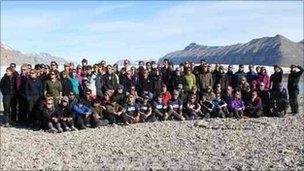
The Svalbard expedition was pictured on 2 August before splitting into smaller groups
Mr Payne said he had changed the original trip wire from fishing line to a heavy duty braided fluorescent cord as the previous system was "going off too easily".
"There was a shortage of stakes on to which the trip wire mechanism is attached," he said. "There was a shortage of the small brass sear, which is a trigger for the device.
"There may have been some shortage of the trip wire itself."
Mr Payne said he met with base camp leaders to come up with a solution and decided to use a safety pin in the device to act as the trigger.
The camp sites were also changed to be triangular in formation to make up for a lack of mines, with Horatio's group having three mines instead of four situated around their site.
Assistant Coroner for Wiltshire and Swindon Ian Singleton asked: "Were you satisfied with the safety aspect of the trip as a whole?"
Mr Payne replied: "The three mines was the only downside, otherwise I was happy."
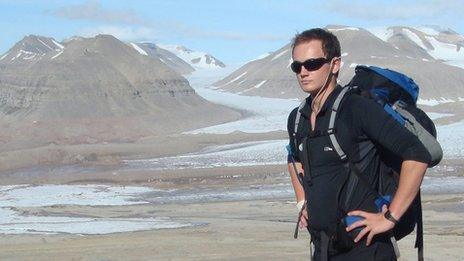
Horatio Chapple's parents said they had harboured concerns about bear attacks
He added: "I have been camping in the Arctic for over 52 weeks and in all that time I haven't had a single polar bear encounter.
"I have never seen one and to have one in that area at that time of year and for it to behave as it did was totally out of character."
An independent report into the death also criticised the expedition.
Sir David Steel was appointed by the British Schools Exploring Society (BSES) - which is now called British Exploring - to conduct an inquiry into the death.
Its publication was delayed to coincide with an inquest into Horatio's death, which opened earlier on Monday.
Four others hurt
"This tragedy was caused by the rare occurrence of an intrusion of a starving polar bear into a camp situated well inland in Svalbard," Sir David wrote.
"It was a remote possibility but not unforeseeable."
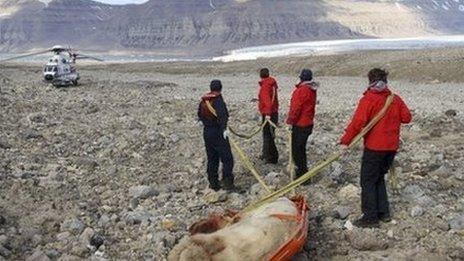
The dead bear was taken away by rescuers
Sir David said the trip wire alert system had "missing pieces of equipment" and was "not an adequate substitute for a bear watch".
Poor storage and deployment of the group's rifle also led to several failures to discharge the weapon, he wrote in the report's conclusions.
The report was ordered a month after the incident and completed in 2012, but its publication was delayed at the request of Horatio's parents.
The Chapple family said in a statement - released before the start of the inquest into Horatio's death and before the report's findings were made public - that they "accept some of the conclusions in the Steel report".
However, they said they "do not believe the account of Horatio's death to be accurate".
The student was asleep in a tent when the bear attacked in August 2011.
Four others were seriously hurt before the animal was shot dead by one of the group leaders.
The injured men were trip leaders Michael Reid, 29, from Plymouth and Andrew Ruck, 27, who is from Brighton but lives in Edinburgh, and trip members Patrick Flinders, 17, from Jersey, and Scott Bennell-Smith, from Cornwall, 16.
Sir David described how the bear had approached through the north-western side of the trip-wire system but none of the warning mines had exploded.
In the report in which the names of the people have been redacted and replaced with coded letters, Sir David says: "The bear appears to have initially made its way to the tent containing E7, E3 and Horatio.
"It would appear likely that the bear must have ripped open the tent on Horatio's side. It then dragged Horatio out causing serious, indeed probably mortal wounds to his head."
The inquest continues.
- Published30 September 2012
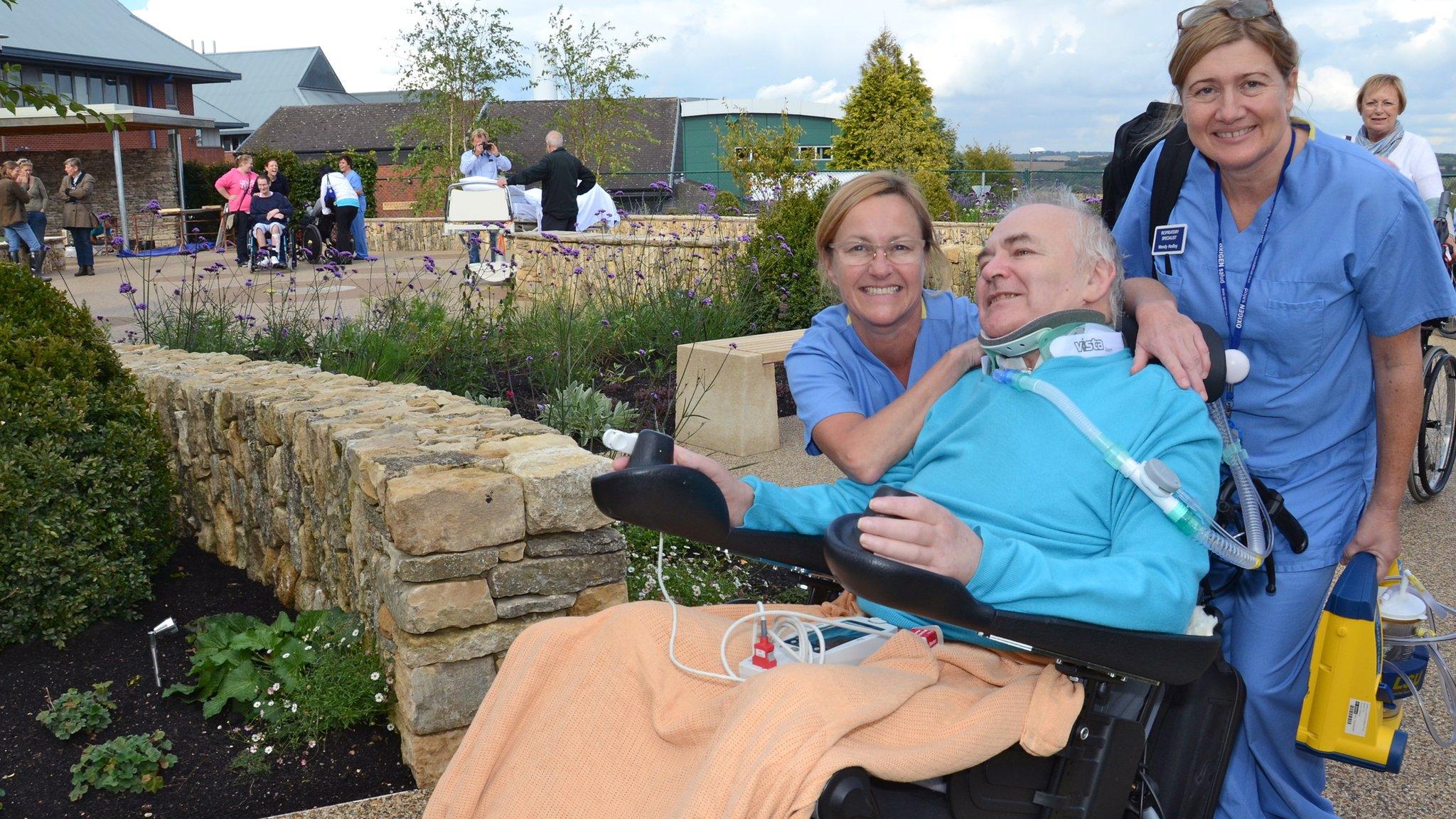
- Published2 March 2012
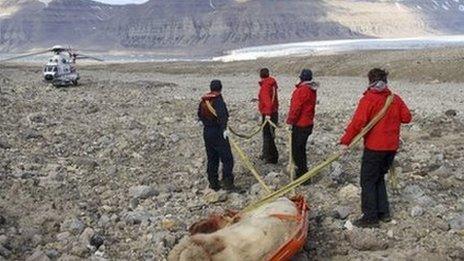
- Published26 August 2011
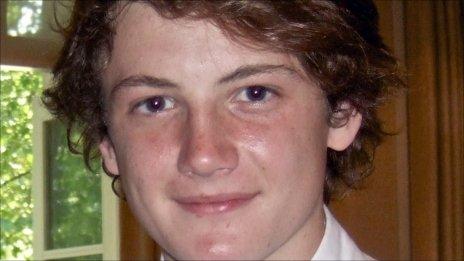
- Published9 August 2011
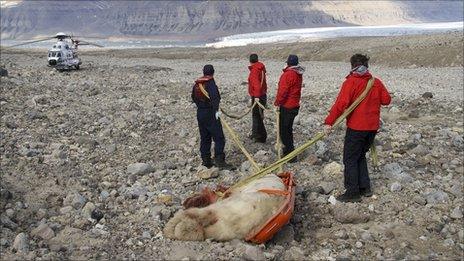
- Published6 August 2011